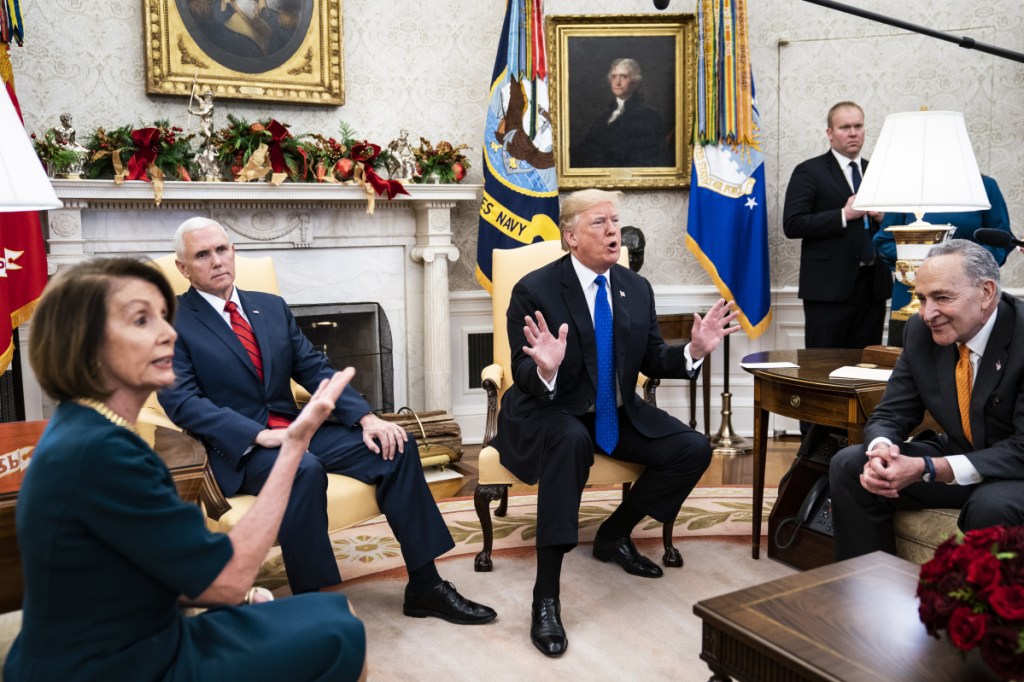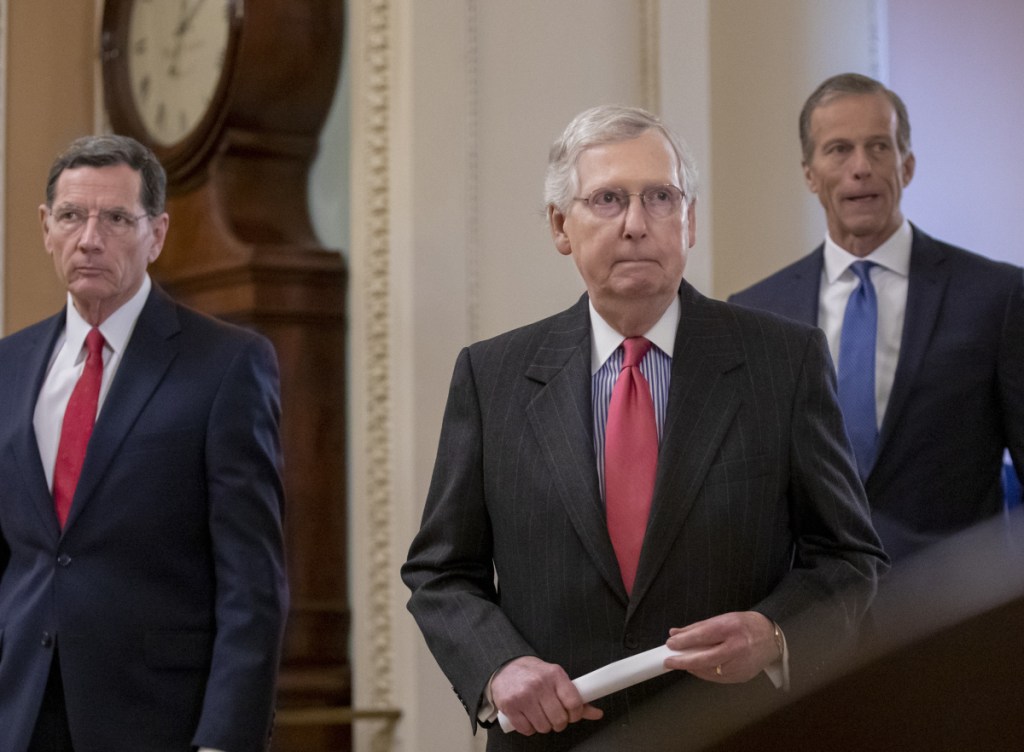WASHINGTON — Senate Republicans charged with solving the impasse over President Trump’s U.S.-Mexico border wall indicated Tuesday that they’re prepared to agree to less money for the wall than Trump wants.
But Republicans said they still don’t know what the president will be able to support in the end – lending an air of uncertainty to their bipartisan talks less than two weeks before another government shutdown deadline.
“Obviously, it’d be great if the president decided to sign the bill,” Senate Majority Leader Mitch McConnell, R-Ky., said Tuesday. “I think we don’t yet know what his view is on this, but I think the conferees ought to reach an agreement and then we’ll hope that the president finds it worth signing.”
Sen. Roy Blunt, R-Mo., a member of the bipartisan committee of House-Senate negotiators that is working on writing a border security bill, said both sides have moved off their initial positions. In the case of Republicans, that was the $5.7 billion Trump has been demanding for his wall, while Democrats’ starting point in the negotiations was to offer no money at all for physical barriers on the border.
Blunt said Tuesday that $5.7 billion “is not a magic number, that’s for sure.”
But he said he doesn’t know whether that’s Trump’s view.
“I think at the end of the day it would be, if we can write this the right way,” Blunt said.
Trump has dismissed the committee’s negotiations as a “waste of time,” and he suggested that he might declare a national emergency that would allow him to circumvent Congress and use the military to build his wall. Many Republican senators oppose that approach, saying it would set a bad precedent for future Democratic presidents, and would just end up getting challenged in court.
Also, Republicans fear they would have to end up voting on a resolution to overturn the emergency declaration – and that it could pass, since it requires only a simple majority vote in the Senate. That was a concern McConnell laid out for Trump in a private meeting last week.
McConnell declined to say Tuesday whether he would support the president and vote to uphold an emergency declaration if it does come to the Senate floor.
“I’m going to withhold judgment about that until we see what he does,” McConnell said.
McConnell’s top deputy, Sen. John Thune, R-S.D., was similarly noncommittal, saying he’d “have to think about it” when asked how he would vote on a resolution aimed at overturning a presidential emergency declaration on the wall.
The comments came as the bipartisan 17-member committee of House and Senate lawmakers faces a Feb. 15 deadline when a short-term funding bill will run out without action by Congress and Trump. The president signed the stopgap bill to bring the nation’s longest government shutdown to an end late last month, relenting temporarily without getting any of the border wall money he shut down the government to obtain.
To meet the Feb. 15 deadline, lawmakers said they need to finalize a deal by the end of this week or early next week.
“Time is running out,” said Sen. Richard Durbin, D-Ill.
Lawmakers on the committee, which includes seasoned negotiators with years of experience on congressional spending committees, said they were trading offers and working in a positive spirit. Republicans in the committee have organized for Wednesday a closed-door briefing with career border security experts. Several insisted that they could easily reach agreement without interference from Trump or House Speaker Nancy Pelosi, D-Calif.
At the same time, the uncertainty over whether Trump would support their final product created awkward questions about whether their whole effort could be pointless. Lawmakers were waiting to hear what Trump said in the State of the Union address later Tuesday, though there was little expectation that he would offer specific parameters to guide their negotiations.
“I just think if there’s a good faith effort to find the common ground, to define what a physical structure, physical barrier might be or look like, and some flexibility on whatever the number is, there’s a deal there,” Thune said. “And I hope that if there’s a deal struck by the conference that the president would be willing to sign it. But I don’t have any guarantee of that.”
Sen. Lindsey Graham, R-S.C., said on Tuesday that he’d spoken with Trump by phone earlier in the day, and that the president is willing to consider cutting a deal with Democrats.
“He’s very much in the market for a deal,” Graham said in an interview with The Washington Post.
Graham said Trump has been exploring his options ahead of the deadline for a spending agreement, from declaring a national emergency to build his promised border wall or sending more U.S. troops to the Mexican border. Trump alluded to such a move in a tweet Tuesday about a possible “human wall” on the border.
But, Graham said, Trump “prefers a deal” at this point and is aware that many congressional Republicans would oppose him taking unilateral action, even as they support his calls for bolstered border security.
“He asked me, ‘What are the chances (of a deal)?’ ” Graham recalled of the conversation. “We talked about how there may be a bit of softening from the Democrats on border barriers, so it’s worth looking at the money he could get from Democrats on something there.”
Graham added: “Now, he’s skeptical. But he’s willing to listen. I told him, ‘Let’s say you get $2 billion for barriers. That’s less than the $5.7 billion you want, but let’s talk about what could fill out the rest – what you’d get in exchange for doing that.’ “
Graham said Trump continues to be wary of the congressional negotiations but could give their legislative end product a serious look this month as he navigates divided government and tries to avoid another shutdown.
“We made a mistake when we didn’t take the border deal the Democrats offered last year, trading the wall for DACA and TPS,” Graham said, referring to floated protections under the Deferred Action for Childhood Arrivals program for undocumented migrants brought to the U.S. as children and people from certain nations who are seeking temporary protected status.
“He’ll go it alone if he has to,” Graham said, “but he doesn’t want to just yet.”
Copy the Story LinkSend questions/comments to the editors.




Success. Please wait for the page to reload. If the page does not reload within 5 seconds, please refresh the page.
Enter your email and password to access comments.
Hi, to comment on stories you must . This profile is in addition to your subscription and website login.
Already have a commenting profile? .
Invalid username/password.
Please check your email to confirm and complete your registration.
Only subscribers are eligible to post comments. Please subscribe or login first for digital access. Here’s why.
Use the form below to reset your password. When you've submitted your account email, we will send an email with a reset code.